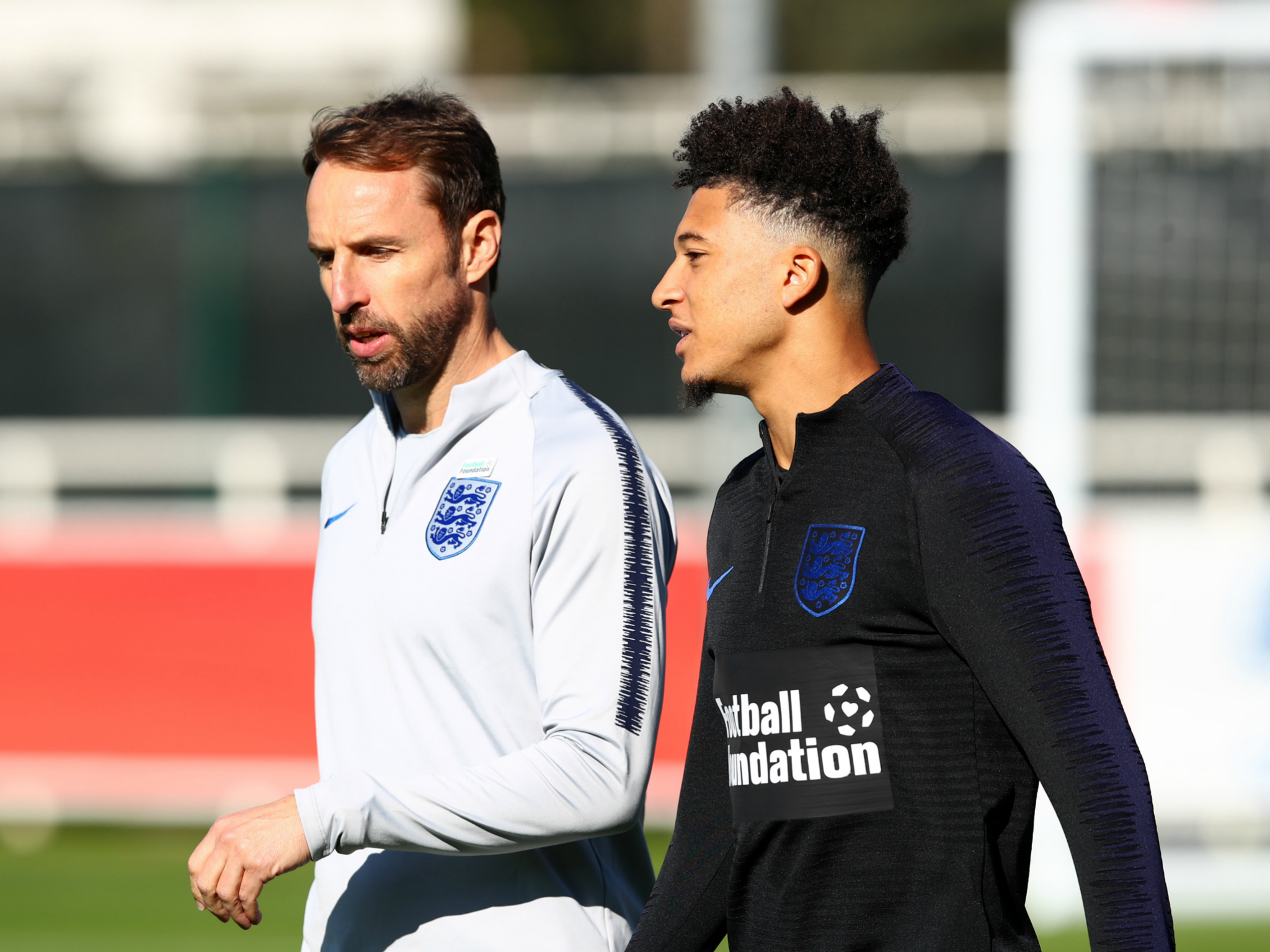Uefa Nations League relegation holds no fears for Gareth Southgate as he ramps up England's youth movement
Call-ups for Jadon Sancho, Mason Mount and James Maddison underline that the Three Lions boss is taking the long view

A spectre is haunting Europe, the spectre of relegation.
By the end of the November international break, 13 European teams will face something they have never endured before: relegation, within the new Uefa Nations League’s four-tiered format. At the end of this autumn cycle, five teams will drop down into League D, four teams will drop into League C and another four will drop into League B.
England must prepare for the possibility that they will end up in that last group of four, losing their place among the elite.
That is where England will be heading for if they lose both of their difficult away games this week. They face Croatia in Rijeka on Friday night and Spain in Seville on Monday. Return empty-handed and they will be stranded on the bottom of Group 4 with no points from their first three games. In that scenario, one point for Croatia in November would be enough to condemn England to the trapdoor. Even a big win at Wembley on 8 November might not be enough to save them.
For some, this would be a disaster. It would mean England having to play in League B for the 2020-21 iteration of the Nations League. No more top-class opponents in competitive matches to prepare England for what they will face at the 2022 World Cup. No more prestigious opposition to help to fill Wembley, or wherever England are playing their home games by then. And a fear that all that hard work to get England back to the top table of European football might have gone to waste.
Gareth Southgate does not see it this way. For him, relegation would be no disaster. Of course he wants England to win their games this month. Of course he would like them to top Group 4 and be part of the play-offs, most likely in Portugal next June. But if they do not, the prospect of relegation does not keep him up at night. Southgate was in charge, remember, for Middlesbrough’s traumatic relegation from the Premier League in May 2009. That was a disaster for the club and for the region, the end of 11 years of top-flight football, prompting tears in the stands. This would be a very different prospect.

Asked last month, before England’s friendly against Switzerland, whether he was anxious about England’s group position, Southgate shrugged it off. “We’ve got to try to find a way to win those matches,” he said of the remaining games. “But I can’t be worrying about where we finish in that group.” From a manager who often likes to see both sides of any issue, it was a surprisingly definitive answer.
Last week at St George’s Park, Southgate unveiled an England squad that had more youthful promise and potential than any group he had picked so far. With Mason Mount, Jadon Sancho and James Maddison in the 23, it is arguably the most exciting England squad in a generation.
But it was not the squad of a manager who is determined to preserve England’s status in League A for the next Uefa Nations League cycle. If Southgate had wanted to do that, he could have picked a more experienced group – Ashley Young, Gary Cahill, Daniel Sturridge and the rest – to try to dig a point or two out of this week, and to scrape second place. But that is not how Southgate works. He wants to develop young players, whatever that means for England’s immediate chances.
“We could have gone with some guys who have had good Premier League careers, who are 26 or 27,” Southgate explained last Thursday. “But our preference is to look at some really exciting young ones, who've proved at youth level they're as good as anything around the world.”
Hence the youthful feel of this group. “We think some of those young players are so exciting that it's important we invest time in them,” Southgate said. “These matches from September through to Christmas, we talked about how to best use that period and what can we learn from those games. The quality of the games and the quality of the opposition is high, but also we wanted to learn some tactical things and learn about some individuals. We've got 18 matches before the European Championship.”
That is what it all comes down to. It is the finals the year after next, climaxing at Wembley in July 2020, that Southgate has his eyes on. Everything he does between now and then will be about giving England the strongest possible team for those Euros, and then taking an even better team to Qatar two years after that.
Because the European Championship and World Cup have already earned their prestige as tournaments, and fans and players know how they feel about them. The Uefa Nations League is not. And so if England are relegated next month, because they are building for 2019 and beyond, Southgate will accept that as the cost of investing in youth. Do not expect any tears in the stands.
Join our commenting forum
Join thought-provoking conversations, follow other Independent readers and see their replies
Comments